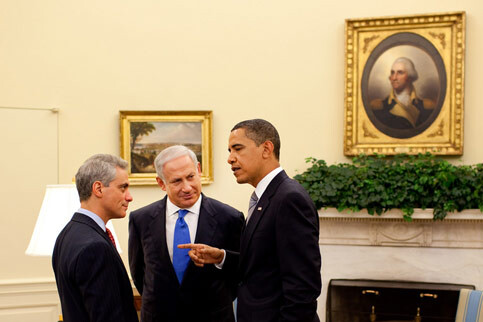The Electronic Intifada 21 May 2009

President Barack Obama talks with Israeli Prime Minister Benjamin Netanyahu and White House Chief of Staff Rahm Emanuel in the Oval Office, 18 May 2009. (Pete Souza/White House Photo)
Seldom has an encounter between an American and Israeli leader been as hyped as this week’s meeting between US President Barack Obama and Israeli Prime Minister Benjamin Netanyahu. As expected, Obama committed himself to diplomacy with Iran and pledged an enormous effort to achieve a two-state solution. Netanyahu continued to incite confrontation with Iran and refused to commit himself to a Palestinian state.
On the surface it may seem there are real differences and that the forces arrayed on each side — including the formidable Israel lobby — are gearing up for an epic battle to determine the fate of US-Israeli relations.
But Obama offered little new, reaffirming well-worn US positions that view Palestinians, particularly Hamas, as the aggressors, and Israel as the innocent victim. While calling for Israel to halt settlement construction (as US presidents have done for decades), Obama offered no hint that he would back those words with action. Quite the contrary, the president said he would urge Arab leaders to normalize relations with Israel, rewarding it in advance of any renewed peace talks.
Let us assume for the sake of argument that Obama applies unprecedented pressure to force Israel to make a deal with the Palestinians. What would such a deal look like? The outlines were suggested in the recent report sent to Obama by a group of US elder statesmen headed by former National Security Advisor Brent Scowcroft. The document, warning that there was only a “six to twelve month window” before all chances for peace evaporated, called on the US to forcefully advocate the creation of a Palestinian state. But this would be a demilitarized truncated state “based on” the 1967 borders. Israel would annex large West Bank settlements and there would be no right of return for Palestinian refugees. This “state” would be occupied indefinitely by a NATO-led “multinational force,” which the Scowcroft group suggests could also include Israeli soldiers (see “A last chance for a two-state Israel-Palestine agreement, 2009).
Of course the Scowcroft proposal does not necessarily represent Obama administration thinking, but it expresses the pervasive peace process industry consensus that views such an outcome as “reasonable,” “pragmatic” and all but inevitable, and it accords with Obama’s own statements opposing the right of return and supporting Israel’s demand to to be recognized as a “Jewish state.”
In other words, what the vast majority of Palestinians would view as a horrifying plan to legitimize their dispossession, grant Israel a perpetual license to be racist, and turn the apartheid regime set up by the Oslo accords into a permanent prison, is now viewed as bold and far-reaching thinking that threatens to rupture American-Israeli bonds.
Netanyahu has little to lose by embarking on another “peace process” after making a show of resisting American pressure (or extracting more American concessions or money). He knows the chances of ever getting to the stated destination are nil. Obama will not apply significant pressure, and even if he did, it is unclear on whom he would apply it, since on the Palestinian side there are no leaders ready, willing and able to carry off a second Oslo-style fraud against their people.
Obama reportedly believes peace in Palestine is the key to transforming US relations with the “Muslim world.” If he were serious about this, the US would have to break with all its past policies and support peace based on democratic and universal human rights principles and equality — something incompatible with a commitment to Israel as a “Jewish state” practicing legalized discrimination. All the signs are however that the Obama administration will push to try to force Palestinians and Arabs to accept and normalize Israel as it is and that the US will continue to underwrite a morally and politically bankrupt Zionist settler-colonial project with a permanent American military, economic and diplomatic bailout.
The real problem for US-Israeli relations is not to be found in whether Netanyahu utters the magic words “two-state solution.” Rather it is that after Gaza it is impossible to keep peddling the fiction that Israel is a brave, self-reliant liberal democracy deserving of unconditional support. No matter what this administration does, this will eventually result in pressure on Israel — such as growing American public support for the global boycott, divestment and sanctions movement.
Co-founder of The Electronic Intifada, Ali Abunimah is author of One Country: A Bold Proposal to End the Israeli-Palestinian Impasse (Metropolitan Books, 2006). This article was originally published by bitterlemons-international and is republished with permission.





